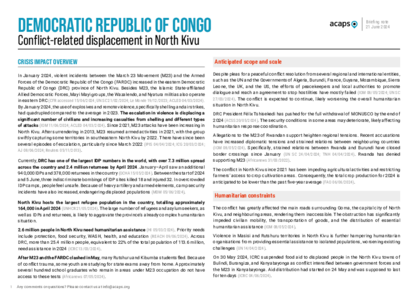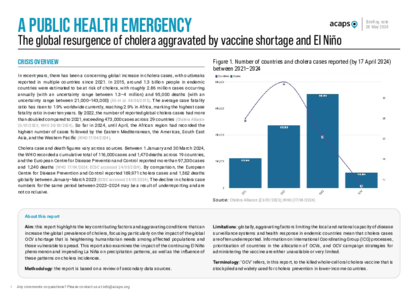Latest updates on country situation
10 February 2025
Despite the unilateral ceasefire that the March 23 Movement (M23) declared on 4 February 2025 and continued diplomatic efforts, violence and displacement persist in eastern Democratic Republic of Congo. Over 3,000 have died, with nearly as many injured by 11 February. Reports of sexual violence are increasing, particularly in displacement sites, while healthcare facilities are overwhelmed with injured patients. Despite a gradual resumption of economic activity, the security situation remains volatile in Goma (North Kivu). Schools were supposed to reopen on 10 February, but low attendance reflects persistent safety concerns. There are reports of M23 fighters still looting and seizing property, affecting both public facilities and private assets. Violent confrontations in South Kivu are also causing thousands to flee towards Bukavu. In North Kivu, an NGO suspended food assistance after three staff members were killed. Health services continue to be severely stressed, with medicine shortages and escalating risks of cholera, malaria, and other contagious diseases from disrupted water supplies.
(RFI 09/02/2025, France 24 09/02/2025, OCHA 11/02/2025)
04 February 2025
By 4 February 2025, the recently escalated conflict in Goma between the March 23 Movement (M23) and the Congolese army had killed at least 900 people and injured nearly 2,880. Health risks are increasing because of limited access to clean water and medical care. On 4 February, the M23 declared a unilateral ceasefire, but the situation remains volatile. (OCHA 04/02/2025, DW 03/02/2025, APA 04/02/2025)
28 January 2025
In 2025, the March 23 Movement (M23) has reached Goma, the capital of North Kivu. Heavy clashes with the Armed Forces of the Democratic Republic of Congo have killed at least 17 people and injured over 370. The influx of wounded people, including civilians and children, is overwhelming hospitals. Over 400,000 people have been displaced in January alone, with affected families facing dire conditions and protection risks, including sexual violence, looting, and the arbitrary arrest of people accused of being rebels. Parts of Goma are without water and electricity, and insecurity has suspended food assistance. The capture of supply routes, including Minova, is aggravating fears of food shortages for Goma's nearly one million residents. Humanitarian access remains severely restricted. Urgent needs include food, shelter, healthcare, and protection. The conflict shows signs of expanding, as M23 advances towards South Kivu, threatening Bukavu and raising the risk of broader regional destabilisation. (Protection Cluster 28/01/2025, TV5MONDE 28/01/2025, ICG 28/01/2025)
14 January 2025
Since early January 2025, intense clashes have continued in Masisi territory (North Kivu) between the Congolese Armed Forces and the M23 armed group. Fighting remains dynamic, with shifting control of Masisi-Centre and surrounding areas. Over 100,000 people have been displaced, with civilians seeking refuge in health facilities in Masisi and Nyabiondo and others moving towards Minova and Numbi in South Kivu, where hospitals are also treating the wounded. Humanitarian access remains limited because of insecurity, while urgent needs include food, medical care, and shelter. Territorial disputes persist across the region, maintaining limited humanitarian presence and raising protection concerns. (RFI 14/01/2025, MSF 09/01/2025, OCHA 07/01/2025)
24 September 2024
Between 13–21 September 2024, members of rival non-state armed groups perpetrated a series of violent incidents in Djugu territory (Ituri province). They killed 31 civilians in Pimbo and Jina health zones and two in Djugu health zone. They also looted six health centres, displacing about 26,000 people to safer areas of Djaiba and IDP sites in Loda, Bule, and other towns]. Movement has been suspended on Route Nationale 27, affecting humanitarian access to around 60,000 IDPs and host communities in Drodro, Fataki, and Mangala health zones. (OCHA 24/09/2024, Radio Okapi 23/09/2024)
17 September 2024
Recent clashes between the March 23 Movement and the Wazalendo armed group have triggered population displacement in Rutshuru territory (Nord-Kivu). On 17 September 2024, it is reported that more than 31,200 people (6,000 households) had fled their villages in Kihondo to seek refuge in the locality of Bambo. The displaced people need assistance in shelter, protection, and health services. Local authorities have raised concerns about the impact of bad weather on the IDPs. (Radio Okapi 17/09/2024, Actualité.CD 16/09/2024)
27 August 2024
The Democratic Republic of Congo continues to be the country facing the highest impacts of the mpox epidemic, with 17,887 suspected cases and 609 potential deaths reported in 2024 by 22 August. Équateur, South Kivu, and Sud-Ubangui are the most affected provinces. Humanitarian needs include access to vaccination, clean drinking water, healthcare services, and waste management. (WHO 23/08/2024, MDM 23/08/2024)
current crises
in
DRC
These crises have been identified through the INFORM Severity Index, a tool for measuring and comparing the severity of humanitarian crises globally.
COD001 - Complex crisis
Last updated 28/02/2025
Drivers
Conflict
Displacement
Socio-political
Crisis level
Country
Severity level
4.4 Very High
Access constraints
4.0
Analysis products
on
DRC
13 March 2025
DRC: Anticipated implications of US stop-work orders and subsequent cuts
DOCUMENT / PDF / 1,014 KB
This report analyses the current and potential implications of the US SWOs, subsequent cuts on humanitarian operations, and needs in the DRC, with a focus on the escalating humanitarian needs in eastern DRC provinces as conflict persists.
05 February 2025
DRC: Conflict escalation in Goma (North Kivu)
DOCUMENT / PDF / 489 KB
Since the beginning of 2025, conflict in eastern Democratic Republic of Congo (DRC) has escalated significantly, with the March 23 Movement (M23) non-state armed group and allied Rwandan forces entering Goma, the capital of North Kivu, on 26 January.
19 December 2024
DRC: conflict across the west
DOCUMENT / PDF / 640 KB
The conflict in Kwamouth territory, Mai-Ndombe province, in the western DRC erupted in June 2022 because of a longstanding dispute between the Teke and Yaka communities over land rights and customary fees. Factors such as increasing population pressure, resource scarcity, and political manipulation have aggravated conflict between the two communities. As of 24 October 2024, 146,000 people have been displaced.
Attached resources
21 June 2024
Democratic Republic of Congo: conflict-related displacement in North Kivu
DOCUMENT / PDF / 1 MB
In January 2024, violent incidents between the March 23 Movement (M23) and the Armed Forces of the Democratic Republic of the Congo (FARDC) increased in the eastern Democratic Republic of Congo (DRC) province of North Kivu.
28 May 2024
Global increase of cholera: aggravated by vaccine shortage and El Niño
DOCUMENT / PDF / 341 KB
This report highlights the key contributing factors and aggravating conditions that can increase the global prevalence of cholera, focusing particularly on the impact of the global OCV shortage that is heightening humanitarian needs among affected populations and those vulnerable to spread.






